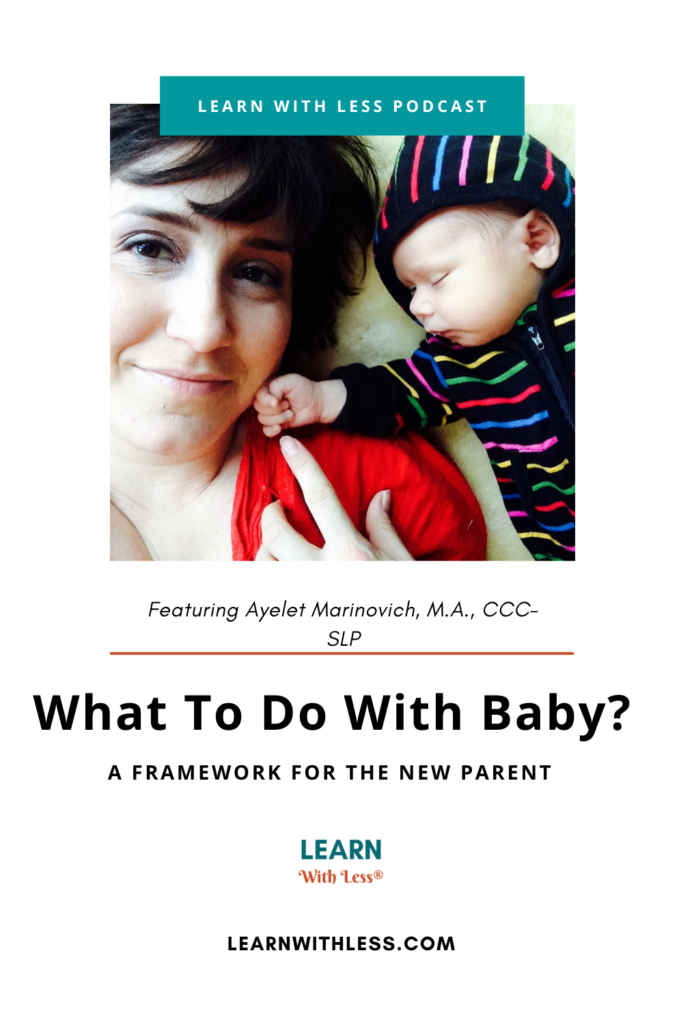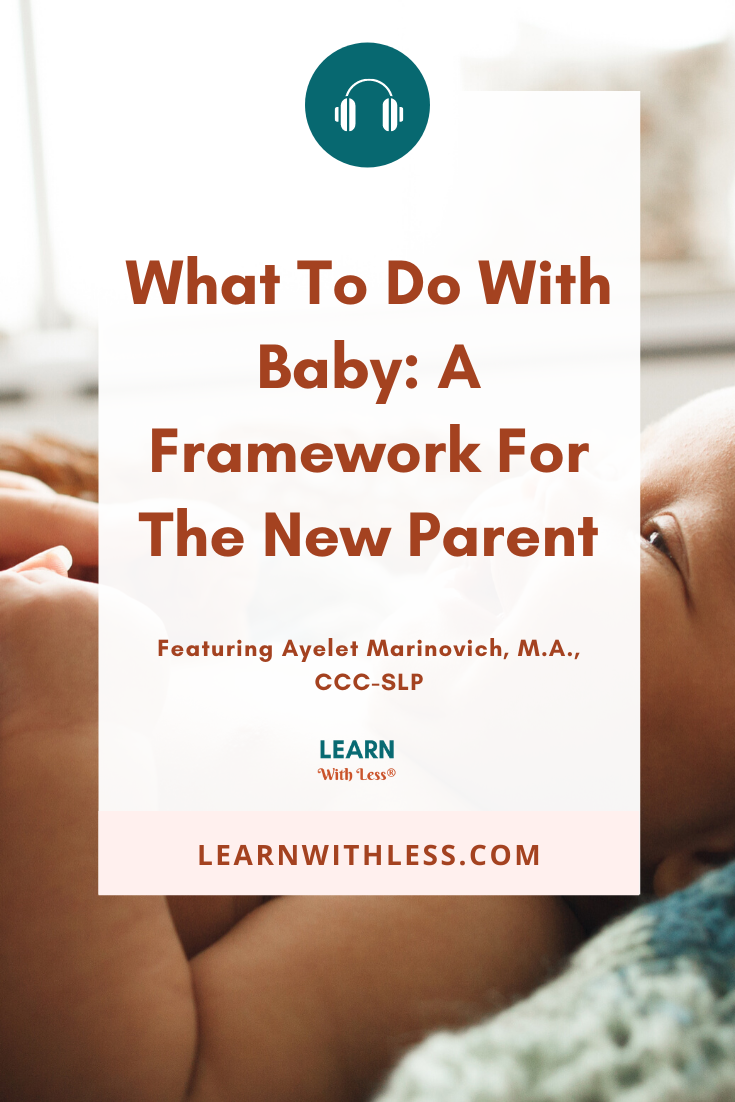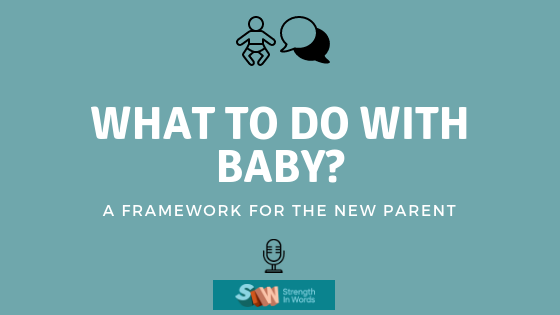How do I best support my baby’s learning?

The Learn With Less podcast is a family enrichment program for parents, caregivers, and infants and toddlers of all developmental levels. In this podcast series, we get together to sing a few songs, discuss some ideas for play, outline some insight about early development, and talk about life as a parent or caregiver in these early years of parenthood. As many of you know, I released my first book in May 2018, Understanding Your Baby: A Week-By-Week Development and Activity Guide For Playing With Your Baby From Birth to 12 Months. And today, what I’d like to do is to just give you a little bit of insight about how I became the person to write this book.
I am a speech-language pathologist. For the entirety of my career, I’ve been working with early communicators. Much of my focus has been in early intervention, which is birth to three years. When I became a mom, it really dawned on me how much more work I had to do as far as the parent education piece. So, I want to just give you a little bit of a background and give you the rationale behind what I do with Learn With Less, and what I do with families with infants. So here goes!
We All Start The Same
Regardless of who you are, where you come from, what language or languages you speak, you and I (and anyone who considers themselves a parent or caregiver) are each ultimately responsible for raising humans. When we understand more about how humans all over the world develop and learn, we feel more empowered to parent.
Regardless of whether you’re a first time or a “seasoned” parent or caregiver, when you have an infant, you are in the thick of it. Becoming a parent (or any type of caregiver – I’ll use these words interchangeably throughout) to a new person is an enormous undertaking. Regardless of how much (or how little) we think we know about babies, there is so much to learn. I want you to remember that we all feel vulnerable, and we all want the best for the children in our care.
At Learn With Less, we do not aim to cover the divisive topics on which we tend to stand vehemently behind opposing lines. This is about our babies. This is about you. I want to provide gentle support to help you understand and connect with your baby, so you can move together through the first year of caregiving. We mix the developmental research (the science) with the creative ways to support the developmental stages your baby moves through (the art). We are going to get to the heart of what it is to be a caregiver of infants.
Infants (and toddlers) learn through observation, imitation, and interaction. When we learn more about what “play” looks like using very simple materials, we feel some peace of mind that we all crave as parents. Peace of mind is what we all want: we want to know that we are doing all we can to raise decent human beings.
That’s what I aim to provide at Learn With Less. That’s the kind of community that I’m fostering, and that’s what I’d like to begin to offer you with this book. It’s all about finding the joy in the mayhem. Parenting infants and toddlers is crazy – I’m not going to tell you I can take that away… I can’t! What I can do is to help you find the joy in the connection, and start to build the foundation for a lifetime of learning.
My Journey Into Parenthood
I was 10 weeks pregnant with my first baby when my husband and I moved across the world. Surrounded by new people, customs, systems, and struck by the newness of the journey toward parenthood, I was very focused on creating connections.
When my baby was born, I decided to combine my professional background and my desire to create a safe, social learning space for myself and my baby along with other caregiver-baby pairs. I started to devise a curriculum that was based on my own developmental knowledge, that of my friends and colleagues in early learning, a ton of developmental research, and information and experiences I integrated as a mother along the way.
Through this process, I learned several things. First, I learned to become more confident as a mother. I learned to listen to myself, to my baby, and to other caregivers, distilling information that was pertinent to me (and to my baby) and of interest to the other caregivers around me. Perhaps most importantly, I learned just how powerful knowledge can be.
There are so many divisive topics in the world of parenthood. In the beginning, I was very fixated on these issues, because the choices we make about how to nourish and support our babies feel all- encompassing in those early days of parenthood. These are individualized, personal choices. I searched for information – and often, I was met with “experts” and “solutions,” when really, what I needed was knowledge.
When I stepped back and remembered how much I understood about how babies learn, I began to feel more connected to my baby – and more empowered as a mother to make decisions about all aspects of parenthood. When I shared that information with other caregivers, they felt the same way. Now, I’d like to share it with you.
My Professional Background
I want to start by saying that I certainly don’t know everything there is to know about infant development. That said, over the last several years, I’ve sharpened and deepened my professional knowledge as a practicing pediatric speech-language pathologist. I’ve mothered my way through two very different early parenting experiences.
I’ve also interviewed countless professionals about the ways we can support infants and toddlers in the areas of cognition, communication, motor/ sensory, and social/emotional development, and read a good deal of the developmental research and literature that informs how (and what) we practice as professionals in the world of early child development.
Much of my professional background is in early intervention. I have dedicated my career to working with “early communicators,” primarily with infants and toddlers and their adult counterparts. In the world of education, the term “early learning” often refers to children who are not yet school-aged, but who are in the pre-school years… but we know that babies are learning from day one (and even before). We know that their parents and caregivers are learning, too.
Those first few years of life set the stage for the rest of our child’s life. Now, I don’t say that to add to the incredible pressure we have as parents and caregivers to “do enough” for our children. That weight is already more than sufficiently heavy! In my mind, it’s about simplification. We desperately need to simplify our lives.
We need access to quality over quantity. Our children need high quality interactions and opportunities to engage with the world, not “the latest learning toy.” We, their caregivers, need access to high quality information and high quality interactions, and an opportunity to reflect upon what’s working and what’s not working – not a million mommy blogs and fancy craft ideas on Pinterest.
When we (as parents and caregivers) feel confident that we have access to resources that actually make a difference, we feel empowered to do the job of raising tiny humans. As an early interventionist, I strive to work within family-centered practice. This means that I help families maximize the opportunities for play and development within naturally occurring, everyday activities, and using materials that already exist within the home. Instead of being the therapist who walks into a family’s home with a “magical” bag of therapy materials, I see my job as that of a facilitator or coach, helping families see the power of routines-based intervention, and focusing on “routines” that are most important to that family.
A routine is any activity that is regularly occurring, that has fairly predictable steps, and that has a clear beginning and end. We all engage in different kinds of routines in our homes – caregiving routines (e.g., eating, dressing, washing), play routines (e.g., infant massage, dance parties, book- reading), social routines (e.g., performing a finger play, playing peek- a-boo, tickling), and daily tasks (e.g., getting the mail, putting on shoes before we go outside). When we can identify these and maximize their value, we can make a huge difference within simple activities (that we’re already doing)!
At Learn With Less, we create resources to improve the quality of your family’s interactions by sharing easily digestible information that increases your knowledge about early development. Come join our community of families and help us spread the word about Learn With Less.
Here’s the key
Because here’s the thing I really want you to take away from all this: you already have all the “right” tools to support your baby. You just need to know how to use them!
So when you learn to recognize the tools that you already have to boost your baby’s development, you are able to maximize the time you have with your baby, you’re empowered to “get it right,” and you’re able to unlock the power of these everyday routines and everyday objects to figure out how to play with your baby.
I invite you to learn to maximize those preciously brief moments, because they are the ones that build big brains. So, if you would like to confidently support the infant and/or toddler in your life (even if you feel like you’re “winging it” most of the time), I invite you to come to learnwithless.com/blueprint. Because when it comes to connecting with infants and toddlers, there is no one-size-fits-all approach or solution. But if you take a moment to tell me more about yourself, I can give you the recipes to more confidently play with and support the little person or people in your life, designed specifically for you – absolutely free. So come on over, and I cannot wait to play with you!

